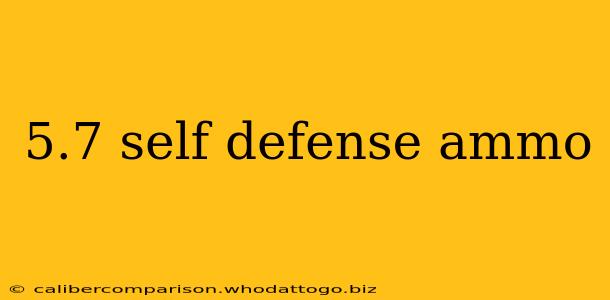The 5.7x28mm cartridge, initially designed for military applications, has gained traction in the civilian market as a self-defense round. Its unique characteristics, however, necessitate a thorough understanding before making it your choice for personal protection. This in-depth guide explores the ballistics, legal aspects, and practical considerations surrounding the use of 5.7x28mm ammo for self-defense.
Ballistic Performance of 5.7x28mm Ammo
The 5.7x28mm's small size and high velocity are its defining features. This combination leads to a flatter trajectory and less bullet drop at longer ranges compared to larger calibers. However, the smaller diameter also means less bullet mass, potentially impacting stopping power. While many manufacturers offer rounds designed for penetration and expansion, the overall effectiveness depends on several factors:
-
Bullet Construction: Different bullet designs (full metal jacket, hollow point, etc.) significantly influence how the round performs upon impact. Hollow point rounds are typically favored for self-defense due to their increased expansion and energy transfer. However, over-penetration is still a concern, particularly with certain bullet designs.
-
Velocity: Higher velocity contributes to greater energy transfer, but also increases the likelihood of over-penetration. The 5.7x28mm's high velocity is a double-edged sword in this regard.
-
Target Factors: The type of target (clothing, barriers, etc.) impacts the bullet's trajectory and effectiveness. Performance can vary greatly depending on the circumstances.
Legal Considerations for 5.7x28mm Self-Defense Ammo
The legality of owning and carrying 5.7x28mm ammunition varies significantly by jurisdiction. Some states have restrictions on certain types of ammunition, including those designed for high penetration. Before purchasing or carrying any 5.7x28mm ammo for self-defense, meticulously research your local, state, and federal laws. Failure to comply with these regulations can result in serious legal consequences.
Restrictions to Consider:
- Magazine Capacity: Some jurisdictions limit magazine capacity, and high-capacity magazines for the 5.7x28mm are common.
- Types of Ammunition: Restrictions on hollow point or armor-piercing ammunition may exist.
- Concealed Carry Permits: Even if the ammo itself is legal, obtaining a concealed carry permit might involve additional regulations and restrictions.
Always consult with a legal professional specializing in firearms and self-defense laws in your area to ensure complete compliance.
Practical Considerations for Choosing 5.7x28mm for Self-Defense
Beyond ballistics and legality, several practical factors warrant attention when considering 5.7x28mm for personal protection:
-
Recoil: Generally, the 5.7x28mm exhibits less recoil than larger calibers, making it easier to handle, especially for smaller individuals. This can translate to faster follow-up shots.
-
Weapon Availability: While the 5.7x28mm is gaining popularity, the availability of handguns chambered for this cartridge may be more limited compared to more common calibers.
-
Ammunition Cost: The cost of 5.7x28mm ammunition can be comparatively higher than some other self-defense calibers.
-
Penetration and Overpenetration: The smaller diameter can lead to both inadequate penetration in certain scenarios and excessive penetration, potentially endangering bystanders. Careful consideration of bullet type and situational awareness is crucial.
Conclusion: Making an Informed Decision
The 5.7x28mm cartridge presents a unique set of advantages and disadvantages for self-defense. Its high velocity and low recoil are appealing, but the smaller bullet diameter necessitates careful consideration of penetration and its overall effectiveness. Before making this caliber your choice for personal protection, thoroughly research the ballistics, legal aspects, and practical implications specific to your location and circumstances. Consulting with experienced firearms instructors and legal professionals is highly recommended. Ultimately, the best self-defense round is the one you can reliably and accurately handle, while understanding its limitations and fully complying with all applicable laws.

